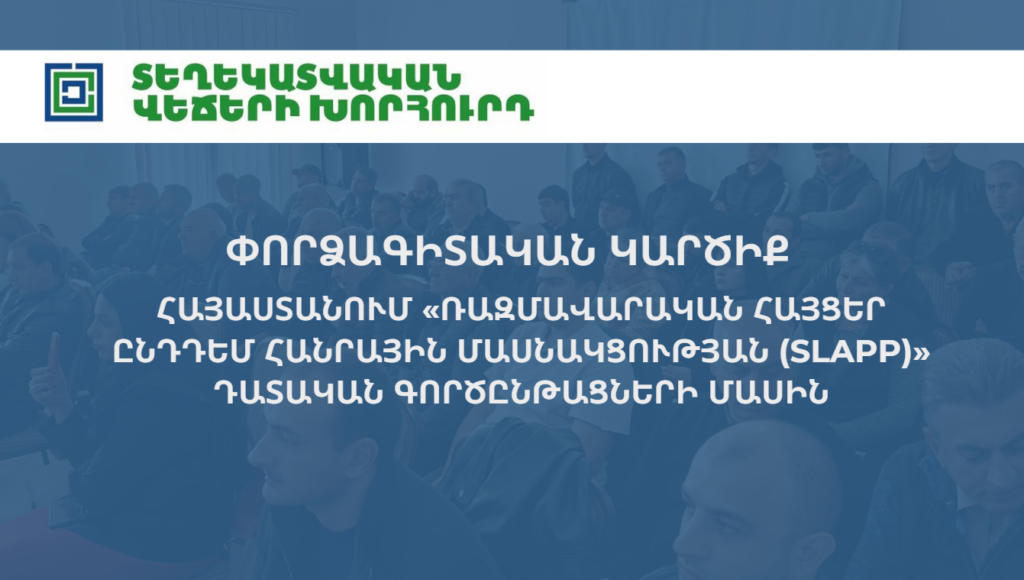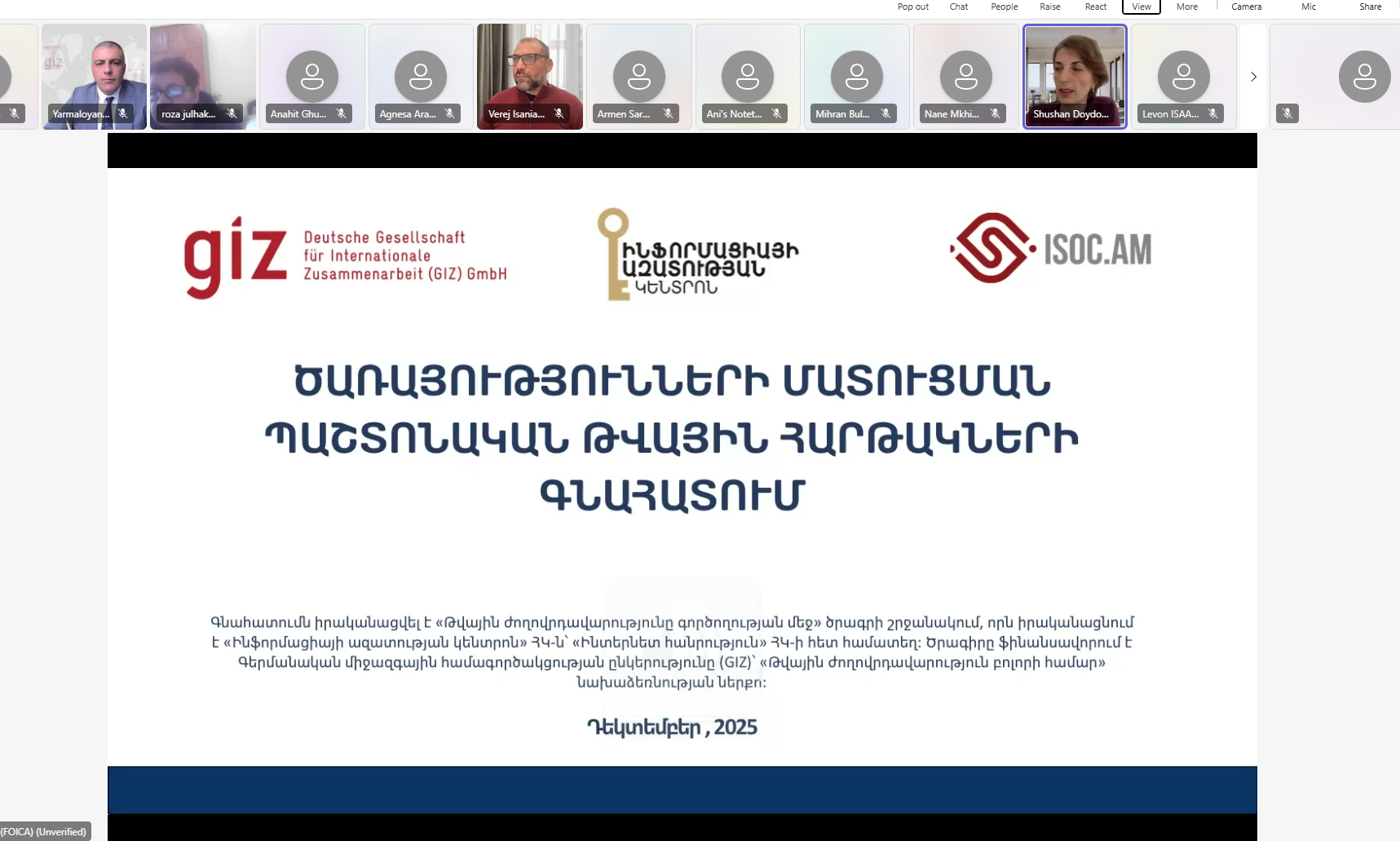Facts
In its previous expert opinions, the Information Disputes Council has repeatedly addressed the lawsuits aimed at silencing human rights defenders and journalists, labeling them as initiatives that pose a threat to democracy. For example, in Opinions No. 80, 87 and 107, the IDC concluded that the lawsuits initiated by a mining company against an environmental activist were not genuinely aimed at protecting the business reputation of the company, but were instead intended to silence criticism, to put pressure on the public and civic engagement of an activist. In Expert Opinions No. 79, 83, 96, 109 and others, the IDC deemed it unacceptable for political parties, high-ranking state officials and politicians to file defamation lawsuits against journalists and human rights defenders, emphasizing that such actions seriously undermine the public’s right to governance. The IDC also called for the withdrawal of lawsuits in such cases and resolving the issues through out-of-court procedures, noting that legal proceedings were detrimental to the mission of journalists and human rights defenders dedicated to protecting the public interest.
Observations indicate a sharp increase in the number of lawsuits filed by large private companies, enterprises, state bodies, politicians, and high-ranking officials against journalists and media in Armenia in recent years. As a rule, these lawsuits are based on allegations of insult and defamation. Nonetheless, such disputes fall under private civil law, and in this regard, the abundance of such lawsuits by state, political, and economic circles is unacceptable.
The findings of the monitoring conducted by the Committee to Protect Freedom of Expression show that in 2024, 41 lawsuits were filed against journalists and media. Of these, 16 were filed by officials, state bodies and a political party, 7 by businessmen, and 6 by the dominant mining company, the Zangezur Copper and Molybdenum Combine. In other words, 70 percent of lawsuits were brought by entities and individuals with large political and economic resources against media, individual journalists and human rights defenders. These statistics indicate that the practice of “Strategic lawsuits against public participation” (SLAPP) is gaining ground in our society, a trend that has raised alarm in different countries in recent years, and is now causing concerns in Armenia as well. In light of this, the IDC finds it necessary to present an opinion on this phenomenon jeopardizing democracy.
Conclusion
“Strategic lawsuits against public participation” (SLAPPs) are typically directed against human rights defenders, whistleblowers, journalists, environmentalists, and other persons engaged in public activities. These lawsuits are often filed by state bodies, politicians, and large private enterprises.[1] The real strategic goal of these lawsuits, often masked by their formal legal content, is to put pressure on defendants, counter their public activities, and restrain their activism. This is reflected, for instance, in plaintiffs initiating unnecessary and lengthy legal proceedings so that defendants incur financial expenses, filing huge claims for damages or motions for various liens, which, if granted, often leave defendants in difficult situations. In some cases this forces defendants to cease their activities or significantly reduce the scale and severity of criticism. The legal grounds for SLAPP lawsuits most commonly include defamation, tarnishing business reputation, copyright infringement, and interference with privacy.
There is no doubt that all this causes significant harm to democracy and fundamental human freedoms. In international law, a consensus is gradually emerging on the necessity of creating legal mechanisms within states and in international relations to counteract this phenomenon, since SLAPP lawsuits also have transnational implications. Some countries have already adopted laws to prevent these proceedings and protect their targets. Such laws are already in place in Canada, Australia, 33 US states, and Belgium. However, in most states, various interest groups seriously oppose the adoption of such laws. The IDC, nevertheless, believes that in Armenia it is also necessary to counter SLAPP processes through special legal acts, given the prevalence of this phenomenon and the large financial and administrative resources being directed toward them.
To combat SLAPPs, on April 5, 2024, the Committee of Ministers of the Council of Europe adopted “Recommendation CM/Rec(2024)2 on Countering Strategic Lawsuits Against Public Participation (SLAPPs)” addressed to the member states of the Council of Europe, where these proceedings are characterized as “legal actions that are threatened, initiated or pursued as a means of harassing or intimidating their target, and which seek to prevent, inhibit, restrict or penalise free expression on matters of public interest and the exercise of rights associated with public participation.” The document recommends that member states of the Council of Europe envisage legal mechanisms to prevent SLAPPs in their legislation. For example, it suggests empowering judges to promptly terminate such proceedings at the outset, as well as envisaging prohibitions on changes to the subject matter of lawsuits, ensuring that the party claiming abuse of rights has no opportunity to maneuver. The document also proposes establishing guarantees for defendants to be compensated for court costs, placing the burden of proof exclusively on plaintiffs, and introducing other guarantees that would increase the risks of filing SLAPP lawsuits, thereby reducing the likelihood of such lawsuits being initiated. It even proposes intorducing a special legal status of a “SLAPP victim” for certain individuals, with beneficial legal consequences resulting from it.[2]
On April 11, 2024, the European Parliament adopted Directive (EU) 2024/1069 “On Protecting Persons Who Engage in Public Participation from Manifestly Unfounded Claims or Abusive Court Proceedings” (“Strategic lawsuits against public participation”), which recommended that EU Member States adopt national laws or legal provisions to protect individuals targeted by civil lawsuits for their active public engagement. In the document, the concept of ‘public participation’ was defined broadly, encompassing the making of any statement or the carrying out of any activity by a natural or legal person within the frames of such rights as freedom of expression and information, freedom of assembly and association, as well as any preparatory, supporting or assisting activities that have a direct and inherent link to the exercise of these rights. The Directive suggests introducing a number of procedural safeguards for defendants, such as regulations allowing courts to dismiss lawsuits against public figures at an early stage, if the judge determines that the real goal of the lawsuit is to silence these individuals and disrupt their activities. One such safeguard involves establishing remedies in favor of the defendant to be provided by plaintiff individuals or organizations in such cases. Furthermore, the Directive suggests envisaging penalties against individuals or organizations for filing so-called “abusive”[3] lawsuits. It can be stated that this Directive has sparked a general legal process in the European Union aimed at preventing SLAPP lawsuits, which, however, may take years, as there is significant resistance to the adoption of such laws in national parliaments. Even the very adoption of the Directive in the European Parliament did not proceed smoothly and required mutual concessions.
Taking into account the above-mentioned developments in international law, as well as the fact that the Republic of Armenia is not only a member of the Council of Europe, but has also signed a Comprehensive and Enhanced Partnership Agreement with the European Union, our state too has an obligation to ensure legal grounds for preventing SLAPP proceedings. Currently, the RA procedural legislation does not offer such opportunities, which is one of the reasons why SLAPP proceedings are on the rise in the country.
In all the cases highlighted by the Information Disputes Council, the courts examined the lawsuits in a general manner, without delving into the defendants’ claims that the real purpose of the lawsuits filed was not to seek legal protection, but to put pressure on their public activities. As a rule, the courts considered these claims to be unfounded, pointing to the absence of direct facts or evidence of such pressure. In fact, in the absence of the required legislative regulations on this issue, judges have no choice but to yield to procedural formalities. Meanwhile, as outlined in the recommendations of the mentioned international organizations, they should be able to reveal the real purpose of the proceedings and dismiss SLAPPs from the outset, preventing the plaintiffs from using judicial mechanisms to constrain the defendant media, journalists, or human rights defenders from engaging in activities of public importance, given that the ongoing legal process, regardless of its outcome, already negatively affects their ability to speak out on public matters. In fact, even if the judge is convinced that the lawsuit is unfounded, the law still mandates them to examine the case in its entirety, a process that can span several years—precisely the result sought by the individuals or organizations filing SLAPPs. Moreover, the RA legislation lacks legal grounds to hold plaintiffs liable for filing manifestly unfounded, abusive, and malicious lawsuits. Consequently, in any case, through such lawsuits, it is possible to keep journalists or human rights defenders under pressure for years, distract them from raising issues of public importance, and force them to waste intellectual, financial, and human resources on judicial proceedings. This, in fact, is the primary objective of SLAPP proceedings.
The IDC will continue to track such legal developments and provide relevant professional opinions to the public. We also call on the Armenian authorities to take action to implement the requirements of the Council of Europe Committee of Ministers Recommendation CM/Rec(2024)2 of April 5, 2024 on “Countering the Use of Strategic Lawsuits Against Public Participation (SLAPPs)”.
Information Disputes Council
Shushan Doydoyan (IDC Secretary), President of Freedom of Information Center
Ara Ghazaryan, Director of “Ara Ghazaryan” Law Firm
Boris Navasardian, Honorary President of Yerevan Press Club
Aram Abrahamyan, Chief Editor of “Aravot” Daily
Ashot Melikyan, Chairman of Committee to Protect Freedom of Expression
Olga Safaryan, Lawyer
[1] A common example is the numerous lawsuits initiated by major private companies against Greenpeace.
[2] See paragraph 41 of the Recommendation.
[3] The term “abusive” should be interpreted both literally and indirectly, referring to instances where the plaintiff abuses their right to file a lawsuit, as the actual purpose of the lawsuit is disguised behind its formal content.








